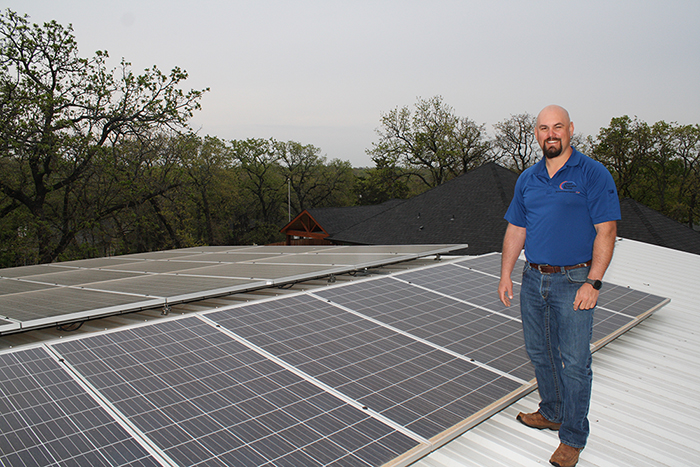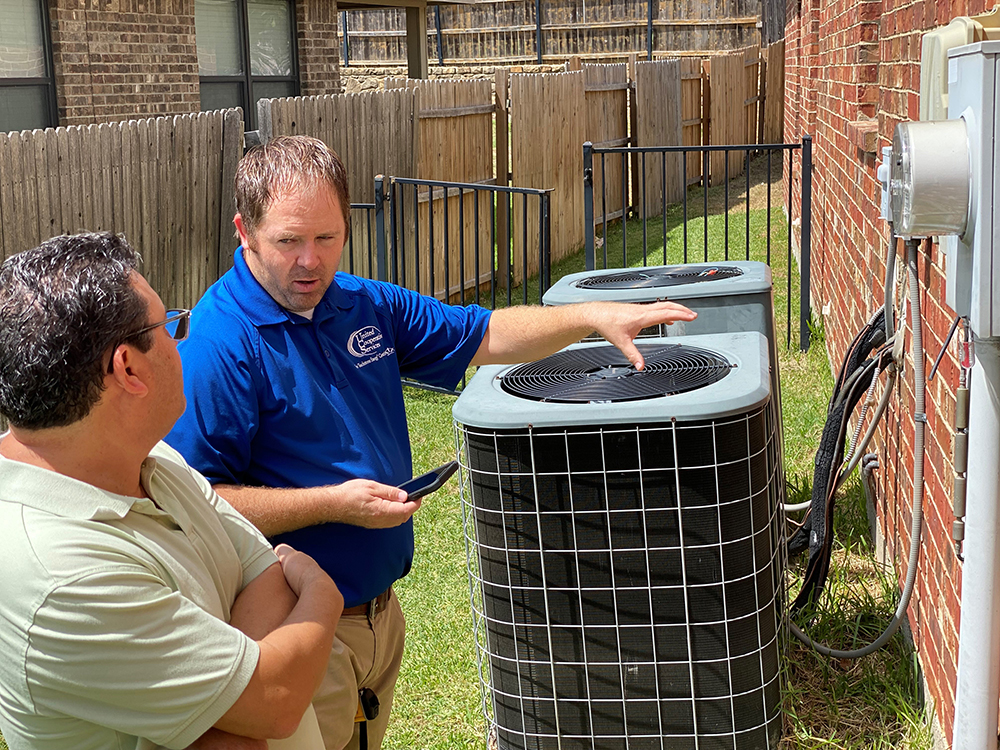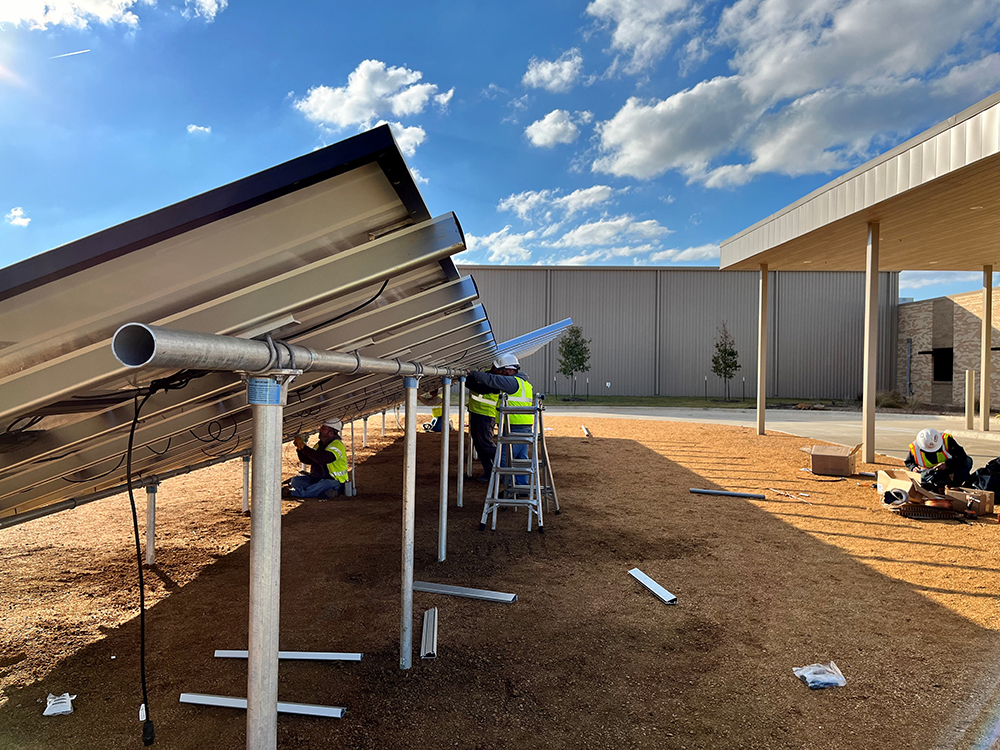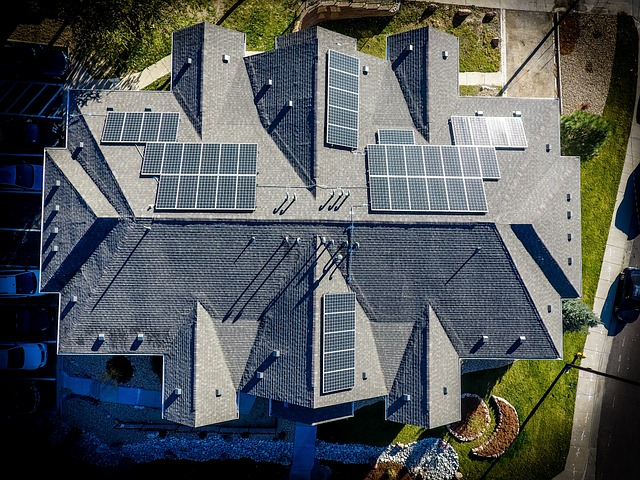YOUR SOLAR JOURNEY STARTS WITH US
 United is excited to announce a new solar installation offering for its members. For years, United’s Energy Solutions Team has educated and guided members through a puzzling financial investment. The cooperative’s new solar solution now takes members from solar education all the way to installation through a third-party installer. United decided to offer this service to its membership in order to educate members and allow members to make an informed decision after being presented with all the facts.
United is excited to announce a new solar installation offering for its members. For years, United’s Energy Solutions Team has educated and guided members through a puzzling financial investment. The cooperative’s new solar solution now takes members from solar education all the way to installation through a third-party installer. United decided to offer this service to its membership in order to educate members and allow members to make an informed decision after being presented with all the facts.
To get started, sign up for a solar solution energy audit today!
Self-educate with the information provided below. Learn what you should know prior to pulling the trigger on installing solar, see firsthand member experience, view real-time solar monitoring at United’s Mansfield location and understand how solar interacts with your bill.
Read a story of one member's experience with United's solar solution process.
START YOUR SOLAR INSTALLATION JOURNEY WITH AN ENERGY AUDIT
Prior to going solar, United recommends a member first complete the energy-efficiency projects proposed by United during the energy audit of the member’s property. These projects typically have a shorter return on investment than installing a solar system. By decreasing a home’s overall electric usage first, a smaller, and therefore less expensive, solar system can be considered.
United is equipped with industry leading design software to explore all available solar solutions and can construct a possible solar solution today that aligns the members goals with historical usage data and the available real estate provided.
Proposals are straightforward and composed of facts, not misleading information.
- Proposed system layout on the property
- Last 12-months usage history
- Estimated solar production for proposed system
- Pre and post solar billing estimates along with Return on Investment (ROI) calculations
United’s goal to evolve and adapt to the memberships’ growing interest in solar, embraces the cooperative spirit.
What happens during an Energy Audit
The United energy expert examines the home’s electrical consumption by inspecting several years of monthly kWh usage, daily usage and weather data. This study allows auditors to see the big picture. In some instances, the expert can diagnose problems before visiting the home.
 While at the home, the auditor interviews the member to understand the home’s characteristics and the typical energy usage behaviors of the occupants.The auditor will determine the leading sources of power consumption in the home and how much those sources are contributing to the total monthly kWh usage.
While at the home, the auditor interviews the member to understand the home’s characteristics and the typical energy usage behaviors of the occupants.The auditor will determine the leading sources of power consumption in the home and how much those sources are contributing to the total monthly kWh usage.
Typical questions focus on the square footage of the residence, type of HVAC and water heating equipment, thermostat settings, hot water usage patterns and other usage habits.
The energy expert will then evaluate water heaters, heating and A/C systems, thermostats, insulation and ventilation in the attic, ductwork, caulking around windows, weather-stripping around doors, lighting and the thermal envelope.
The energy expert takes measurements of doors, windows and the outside of the home. The direction the house faces will be noted to estimate how much heat gain/loss the home may receive through its thermal envelope.
Once the audit is complete, the energy expert will explain any recommendations as well as the potential energy savings the member could expect if certain energy-saving enhancements to the home were implemented. Return-on-investment numbers for some of the report’s key recommendations, rebate eligibility and Co-op Connections vendors are shared with the member. A typical energy audit takes about an hour to an hour and a half to complete.
United's energy experts commonly provide members (while supplies last) with LED’s as replacements for inefficient incandescent light bulbs. If an electric water heater is housed in an unconditioned space, the member will receive a free water heater blanket to place around the heater tank.
RESIDENTIAL SOLAR PRE-INSTALLATION INFORMATION
In keeping with United’s mission of providing exceptional service and value to its membership, United has worked to establish a framework by which its members may purchase from, and have installed by, a third-party contractor/installer, residential solar systems at a competitive price. United’s goal is to help educate its members regarding residential solar, so members are more knowledgeable prior to purchasing a system, and assist members in navigating the solar system purchase and installation process.
1.United has entered into an arrangement whereby its members may contract with a third-party contractor/installer to install residential solar systems. The solar contractor/installer will be responsible for, among other things, surveying the project site, validating and/or re-designing of plans, procuring equipment and materials, submitting and receiving approval from applicable municipalities and HOAs/POAs, and completing the solar installation. The third-party solar contractor/installer will also provide a workmanship and roof penetration warranty.
2.Prior to going solar, United recommends a member first complete the energy-efficiency projects proposed by United during the energy audit of the member’s property. These projects typically have a short return on investment, and by decreasing a home’s electric usage, a smaller and therefore less expensive solar system can be considered.
3.The member will pay United for the residential solar system and installation, and United will release payment installments to the contractor/installer as certain installation benchmarks are met. As compensation to Unitedfor preliminary services provided to the member, facilitating the arrangement between the member and the contractor/installer, and for serving as a disbursing agent with respect to funds relating to the purchase and installation of the solar system, United will retain a portion of the contract price, after paying contractor/installer.
4.Each residential solar system installation is individually evaluated during the application review process to determine if United’s infrastructure will accommodate the specific solar system. If required, United will invoice the member for necessary infrastructure upgrades to accommodate the member’s solar system.
5.United is not a tax advisor and cannot give tax advice. Members should consult with tax and/or legal professionals about the potential for qualifying for any federal, state, or local energy rebate or tax credit, e.g.,a Federal Income Tax Credit (FITC), as well as potential tax liability associated with the installation of a residential solar system. Purchasing a residential solar system becomes more attractive if a member qualifies for certain tax incentives.
6.United is not an insurance advisor and cannot give insurance advice. Members should speak with their homeowner’s insurance carrier and/or an insurance advisor to determine if policy adjustments are needed to cover a residential solar system. Further, members should consider speaking with their roof manufacturer and/or roof installer regarding potential roof penetrations voiding any existing warranties.
7.Members should consider consulting with a realtor or other real estate professional to gain insight into potential changes to market value and desirability of homes equipped with residential solar systems.
8.Members should speak with their mortgage lender, and review relevant loan documentation, to determine what requirements, if any, their mortgage lender may have concerning the member’s purchase and installation of a residential solar system.
9.To receive maximum production from a residential solar system, United recommends that any objects shading the solar panels should be trimmed, removed, or considered when choosing the location of the system. Any shading during solar production hours will significantly limit production.
10.United does not offer any production guarantees or billing percentage offsets for installed solar systems. While United assists in sizing the system according to site specific usage history, member goals, and site layout,monthly solar energy production and energy usage can ultimately fluctuate due to a variety of factors including, but not limited to, weather.
11.Unless a member’s home has backup battery storage and/or a generator, the home will lose power during a grid outage. In the event of a grid outage, a grid-tied solar system is designed to shut down for safety.
12.United does not currently offer routine maintenance services for residential solar systems.
13.Accounts with 50 kW DC and below are net metered, which means the member is billed monthly on the difference between the energy delivered to the member’s home or business and the energy received by United during the member’s billing cycle. United’s Tariff for Electric Services will control net-metering processes and procedures; however, generally, those processes and procedures are as follows.
•Solar Underproduction (Net Consumer)—If United delivers more kWh than what is received from a solar system, the received kWh are credited back at retail cost and the net energy is billed to the member. Beginning in 2023, all members will be billed a securitization charge due to Winter Storm Uri based on the total energy delivered. For example, if United delivers 1,000 kWh and receives 800 kWh from the solar in a month, the member will receive a bill for the 200 kWh net difference, plus securitization charges on the 1,000 kWh delivered.
•Solar Overproduction (Net Producer)—When the energy supplied by the member exceeds the energy supplied by United during a monthly billing period, the member will be responsible for a minimum bill ($32.50 for residential accounts) plus securitization charges on the total kWh delivered. Any excess kWh will be purchased back at that month’s avoided wholesale power supply costs and deposited into a banked balance on the account. The accrued bank balance will be automatically applied to that month’s minimum bill, securitization charges, and other electric charges, such as area lights. Any remaining banked balance will be applied to future energy charges.
•If the member has an unused banked balance left over at the end of a calendar year, United will issue a check for balances greater than $20 and credit the member’s account for balances equal to $20 or less. The banked balance is reset in January of each calendar year.
•Each metering point is billed independent of one another therefore, any over-generation on one meter will not be used to offset the usage of another meter. If solar is purchased for multiple meters, there will need to be individual, properly sized systems interconnected to each metering point.
•United only receives the excess solar energy that the home does not consume behind the meter, not total production from the system. As solar is being produced throughout the day, the home actively pulls from the solar production first. At any moment, if there is more energy being produced than demand in the home, United will receive the excess solar energy through the meter.
14.Members should review United’s Distributed Generation Procedures and Guidelines Manual for Members.
15.United is not responsible for loss of production during a period when a solar system is not operational.
16.Once United, the member, and the contractor/installer enter into a Solar Power System Purchase andInstallation Agreement, the terms of said agreement will control the purchase and installation of the member’s residential solar system.
 WATCHING A SOLAR ARRAY IN REAL TIME
WATCHING A SOLAR ARRAY IN REAL TIME
In order to show members the impact of a solar system, United has set up a solar array at its Mansfield office. Real-time monitoring of the energy produced by the day, week, month, year and lifetime along with the environmental impact of the array are available to the general public HERE. United did this to help members get real-world expectations for their potential solar installation. It's another way the co-op works for its members.
Key facts about this solar array:
- Designed by United Cooperative Services
- 13.2 kW ground-mount facing south
- Approximately 20,479 kWh estimated solar production annually
- 33 Tier 1 solar panels (Phono Solar Technologies)
- 33 Enphase Microinverters (IQ8A)
How are solar accounts billed?
Accounts with 50 kW DC and below are net-metered, which means members are billed monthly on the difference between the energy delivered to their homes or businesses and the energy received by United during the billing cycle.
- Solar Underproduction (Net Consumer)—If United delivers more kWh than what is received from a solar system, the received kWh are credited back at retail cost and the net energy is billed to the member. Beginning in 2023, all members will be billed a securitization charge due to Winter Storm Uri based on the total energy delivered. For example, if United delivers 1,000 kWh and receives 800 kWh from the solar in a month, the member will receive a bill for the 200 kWh net difference, plus securitization charges on the 1,000 kWh delivered.
- Solar Overproduction (Net Producer)—When the energy supplied by the member exceeds the energy supplied by United during a monthly billing period, the member will be responsible for a minimum bill ($32.50 for residential accounts) plus securitization charges on the total kWh delivered. Any excess kWh will be purchased back at that month’s avoided wholesale power supply costs and deposited into a banked balance on the account. The accrued bank balance will be automatically applied to that month’s minimum bill, securitization charges, and other electric charges, such as area lights. Any remaining banked balance will be applied to future energy charges.
- If you'd like to view sample DG bills, CLICK HERE.
Will members still have a bill with solar?
When the energy supplied by the member exceeds the energy supplied by the cooperative during a monthly billing period, the member will be responsible for a minimum bill ($32.50 for residential accounts) in addition to securitization charges for delivered kWh. Any accrued banked balances will be automatically applied to that month’s minimum bill, securitization charges, and other electric charges such as area lights. It is possible for the banked balance to satisfy the electric portion of the bill resulting in a total electric due of $0. It is important to note that the banked balance will not be applied to United's internet service charges.
 What will happen to any remaining banked balances at end of year?
What will happen to any remaining banked balances at end of year?
If the member has an unused banked balance left over at the end of a calendar year, United will issue a check for balances greater than $20 and credit the member’s account for balances equal to $20 or less. The banked balance is reset in January of each calendar year.
Lean more about renewable energy from United.


